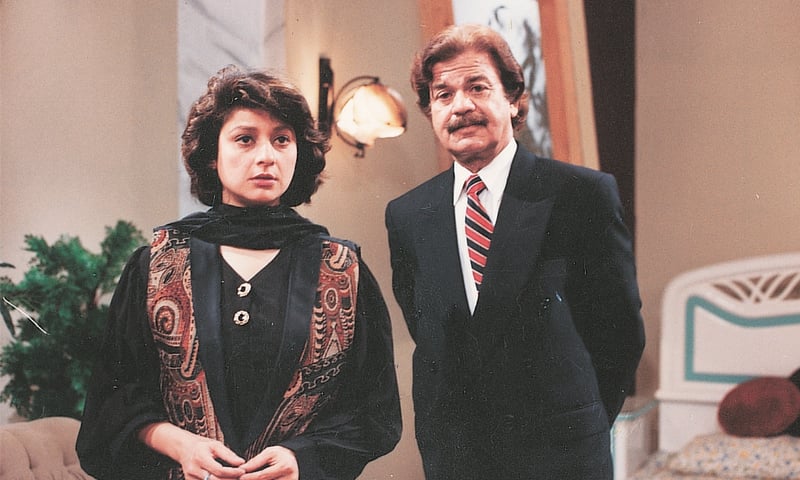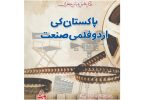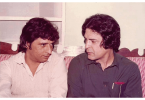Omair Alavi|Published February 12, 2018
QAZI Wajid with Huma Nawab in a TV play.
VETERAN television, radio, film and theatre artist Qazi Wajid died on Sunday, bringing down the curtain on the career of one of the most versatile actors in Pakistan.
He leaves behind his wife, a daughter and grandchildren along with a large number of his admirers to mourn his death. Hospitalised for chest pain on Saturday night, the Raja of iconic TV serial Khuda ki Basti passed away in the early hours of Sunday morning.
His funeral was attended by people from different walks of life including actors Qavi Khan, Jawed Sheikh, Shakeel, Adnan Siddiqui, Behroz Sabzwari, Ayaz Khan and Shahzad Raza (the last three had accompanied him to Saudi Arabia last month) in the evening. He was buried at Eesa Nagri graveyard.
Born in Gwalior, India in 1944 (confirmed by himself in one of his final interviews though it’s widely believed that he was born in Lahore in 1930), Qazi Wajid was one of the longest-serving actors of Pakistan. He made his debut way back in the 1950s when he was a teenager and continued to act till his last breath.
He joined Radio Pakistan as a child artist in the 1950s and was part of numerous hit shows including Qazi Jee, Hamid Mian Kay Haan and the super popular Naunehal. It was in 1956 that his first film, Bedaari, was launched in which he stood out as an actor — for stammering. The film may have been lifted from the Indian hit, Jagriti, but it gave Pakistan’s entertainment industry a name to rule the screen (both films and TV) for many years to come.
In those pre-TV days, Qazi Wajid worked extensively with Ibrahim Nafees on theatre; Khwaja Moinuddin picked him from one of these performances and transformed him into an overnight star with Mirza Ghalib Bandar Road Per and Taleem-i-Baalighan, both of which were performed on PTV in the late 60s. He continued to be part of the play and performed it worldwide, most recently in Australia.
Wajid polished his skills in Radio Pakistan but it was TV where he became an indispensable actor due to his ability to play any kind of a role. In Taleem-i-Baalighan he entertained the audience as Shamsoo The Barber. The iconic TV serial Khuda Ki Basti began with his character, Raja, who was caught cheating at a card game. He played Shakeel’s father in Ankahi and was also part of the iconic Pak-Sino PTV classic Rishtay Aur Raaste while his take on journalism in Anwar Maqsood’s Aangan Terrha is still fresh.
Be it his performance on TV, film or radio, Qazi Wajid was always on top of his game. He claimed to have never played the hero in his life because the protagonist’s role didn’t provide him the margin to explore his abilities. He was the bad guy in Noor-ul-Huda Shah’s Hawwa Ki Beti who sells his daughter and played the cool dad to Marina Khan in Haseena Moin’s Dhoop Kinaray — both the roles were poles apart and proved his mantle.
The younger generation doesn’t know much about his exploits on films and theatre. He loved acting on both the platforms. Theatre was his love and his last bow came in a show he performed in Riyadh a few weeks before his death with long-time collaborators Anwar Maqsood and Behroz Sabzwari. As for films, he once told this scribe that he acted in that medium only because of his friend the late Syed Kamal; most of his films featured him alongside the Raj Kapoor lookalike.
For someone who spent most of his life entertaining people, Qazi Wajid was a modest man. Despite winning several awards — including the Pride of Performance Award — he remained active for his countless fans and didn’t hang his boots till his death, as his biggest award was finding a place in their hearts and staying there forever.
Published in Dawn, February 12th, 2018







